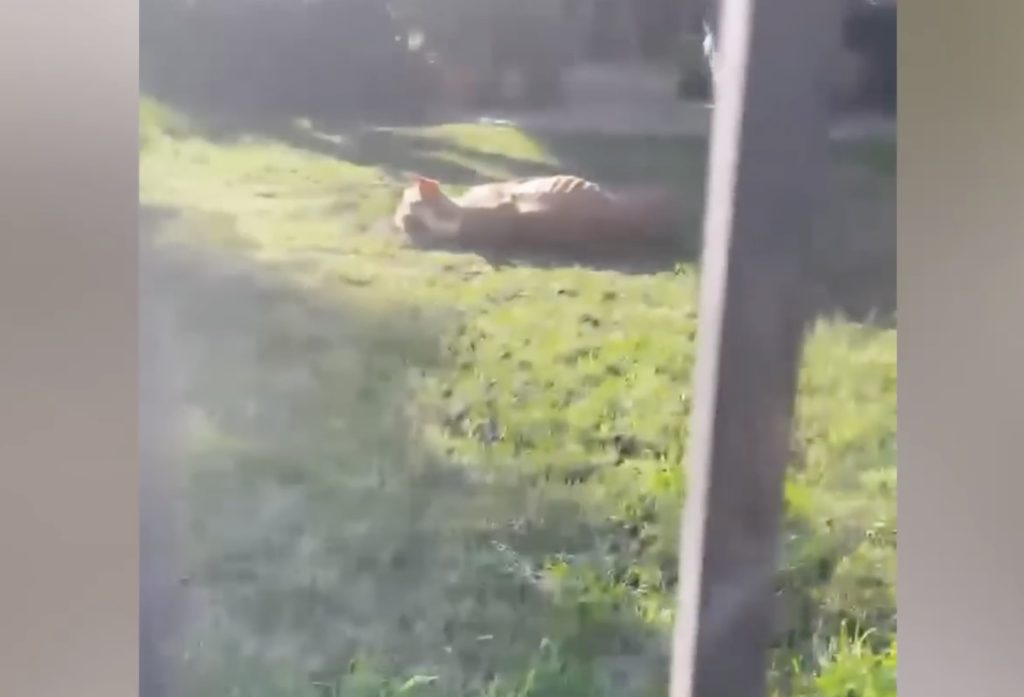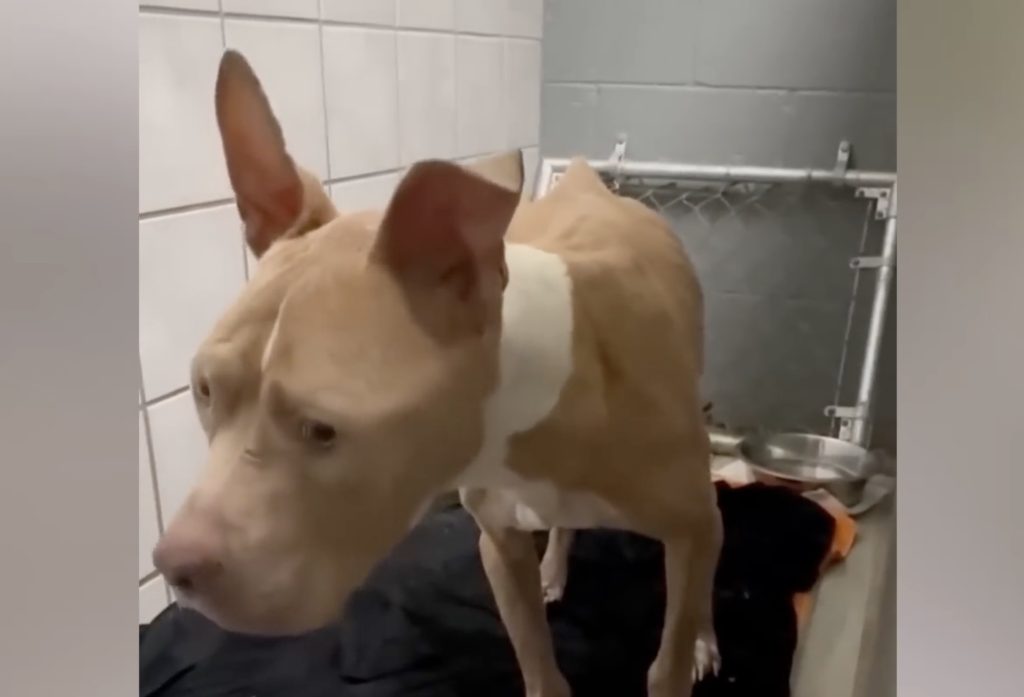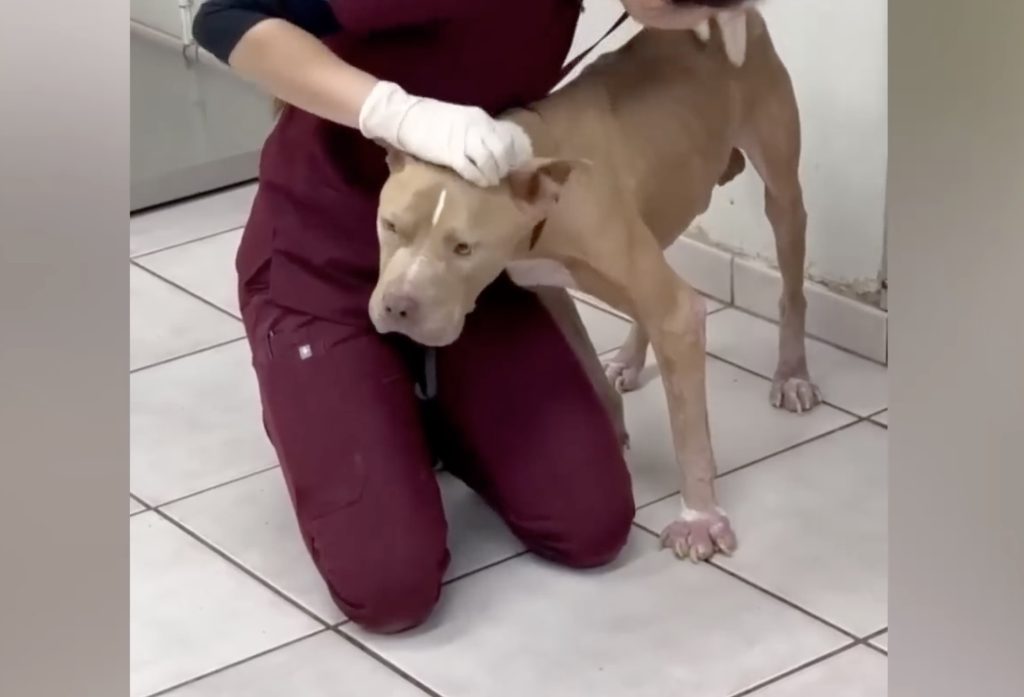When rescuers first laid eyes on Gator, a pit bull from Highland, California, they could hardly believe what they were seeing. He stood alone in a small, barren yard—if you could even call it standing. His body was little more than skin and bones, every rib sharply visible beneath dull, lifeless fur. His legs trembled from exhaustion, and his head hung low as if the weight of his suffering was too much to bear. The look in his eyes told a story that words could never fully capture—a mix of fear, confusion, and quiet hope that someone might finally see him.

It all began when a concerned person shared his photo online, hoping someone would step in. That post spread quickly across social media, and soon, rescuers arrived at the property to investigate. What they discovered left them heartbroken. Gator’s owner claimed that his skeletal appearance was due to some “mystery illness,” insisting there was nothing to worry about. But rescuers had seen enough neglected animals to recognize the truth. Gator wasn’t sick—he was being deliberately starved. He had been kept chained up in that yard, denied food, comfort, and care, all because his owner labeled him as “aggressive.”
The rescuers pleaded with the owner to surrender him. At first, he refused, but when they made it clear they wouldn’t walk away, he finally relented. In that moment, Gator’s long nightmare began to end. As they lifted him gently into their vehicle, his frail body barely moved. It was as if he didn’t yet understand that his life was about to change forever.
At the veterinary clinic, the truth of his condition became undeniable. Gator’s body condition score was 1 out of 9—the lowest possible rating, indicating extreme starvation. The veterinarians worked quickly to stabilize him. His paws were cracked and swollen from standing too long on rough ground. His skin was raw in places, and his ears were painfully infected. Despite all that, he never snapped or growled. When a vet softly stroked his head for the first time, he froze—not out of aggression, but confusion. He simply didn’t know what kindness felt like.
The first bath of his life was both heartbreaking and hopeful. Warm water ran over his frail frame as rescuers carefully cleaned away layers of dirt and neglect. At first, his eyes darted with fear, unsure whether this new touch meant harm or healing. But as gentle hands continued to comfort him, something began to change. His breathing slowed, his muscles relaxed, and for the first time in perhaps years, Gator felt safe. Beneath all that fear was a soul that only wanted to be loved.
Over the next several weeks, Gator began a transformation that felt nothing short of miraculous. Each day brought small victories—his appetite returning, his coat growing softer, his tail wagging just a little higher. He started to trust again, leaning into the people who cared for him, and slowly rediscovering joy in simple things—a warm bed, a kind voice, a soft toy. Rescuers watched with tears in their eyes as he began to play, cautiously at first, then with the pure, unrestrained happiness that only a dog can show.
What made Gator’s recovery even more remarkable was the light that returned to his eyes. Gone was the emptiness that once reflected years of neglect. In its place, a gentle sparkle emerged—a quiet strength, a glimmer of gratitude, and perhaps even forgiveness for those who had failed him. His story became a testament to how compassion can rebuild what cruelty tried to destroy.
Though he still faces ongoing challenges, Gator has proven to be a fighter in the truest sense. His skin issues will require long-term care and specialist attention, but he’s now strong enough to handle whatever comes next. The veterinarians and rescuers who saved him often say he taught them something too—that even when life seems unbearably dark, a little kindness can reignite the will to live.

The day Gator left the hospital was one few will forget. As he stepped outside, the sunlight touched his coat, and his tail began to wag with a confidence no one had seen before. Waiting for him was a loving foster family who opened their home and hearts to him. For the first time, Gator didn’t have to look over his shoulder in fear. He curled up on a soft blanket, sighed deeply, and fell asleep—safe, warm, and loved.
Today, Gator’s journey continues. He’s gaining strength, learning what it means to trust completely, and discovering the simple joys of being a dog again. He loves his daily walks, his new toys, and the gentle voices that call his name. Each day brings new moments of peace, the kind that only come from knowing you’re finally home.
His story is a powerful reminder that behind every rescue is a team of people who refuse to look away. It shows how one act of compassion can ripple outward, changing not just a life, but the hearts of everyone who witnesses it. Gator’s resilience reminds us that even after immense suffering, love has the power to heal.

Some stories stay with us not because of their sadness, but because of their hope—and Gator’s is one of them. Once a forgotten dog chained to despair, he now stands as proof that every soul, no matter how broken, deserves a chance to be seen, cared for, and loved. His journey from starvation to safety is more than just a rescue story; it’s a reflection of what humanity can be at its best. When kindness meets courage, lives are transformed—and Gator is living proof of that truth.





